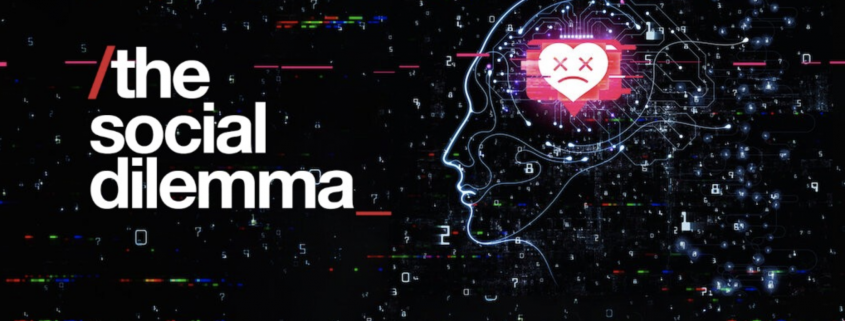All the World’s a Screen: ‘The Social Dilemma’ and the dangers of casual viewing
Writing a biweekly column means you’re often a week or two late in getting to write about something the culture has already discarded. But, I think I have a special excuse since I’m writing a biweekly film column in 2020, when there’s not much material to begin with. Around this time, and during a regular year, there would be awards contenders and box office surprises to discuss, but 2020 has forced us to consider our relationship to “the movies” more than to individual films.
This year, days are all mushed together and draped in sameness. Of course, this is not the best environment for consuming good films — when Netflix is probably the quickest way to pass a good chunk of quarantine time, we are prone to value the act of watching rather than the content. I wrote about giving movies their due during quarantine in my last column. Here I want to take a specific example — Netflix’s “The Social Dilemma” — to show how dangerous it is to watch casually and not critically.
Netflix released “The Social Dilemma” on Sept. 9, a documentary about the dangers of social media, both the platforms themselves and the giant tech companies behind them. The film features insight from former Silicon Valley employees and founding executives who left their companies due to ethical concerns. Most of them realized that their companies were no longer helping people; many of the interviewees found the opposite to be true. They witnessed their businesses dabble with control, behavior manipulation and addiction but never addressing the destructive consequences their platforms have for users and creators alike. In its arguably most troubling section, the documentary exposes how companies like Google and Facebook profit off of personal information and how they turn their users into products to sell to advertising companies. This is not news, of course, but the way it is expressed in “The Social Dilemma” is revealing.
“If you’re not paying for the product, you are the product,” Tristan Harris, the co-founder of the Center for Humane Technology, said in an interview for the film.
We don’t pay for membership to Facebook, Instagram or Twitter because these companies’ revenue comes from advertisers “bidding” for our attention. The highest bidder gets a split-second of our time; the more we scroll, the more they learn about us, the more information they can present to advertisers, the more money they can make. What’s in it for us? A whole lot of wasted time.
As dramatic as this may seem (and the fictionalized storyline that accompanies the film, I believe, adds unnecessary melodrama), the irony is that this film is on Netflix, a platform that tracks our viewing habits and tailors lists of content we might like “because we watched ‘x.’” And, while the documentary gets into vital points about how our social media is even affecting our mental health and political landscape, germane to this column is how these platforms are trivializing what ought to be revered.
Twitter demands that we keep scrolling, lest we miss out on the latest comment or meme; the very layout of that site does not promote quiet appreciation or critical thinking on everything we see. Similarly, Netflix’s endless stream of old and new content can foster an attitude of watching for the sake of just getting through your queue. But, strangely enough, no one ever cleans their watchlist. There are masterpieces on Netflix, but we constantly pass them by for the familiar episodes of “The Office” at our disposal. We may never get to the better content on Netflix, Prime or Hulu — or worse, if we do watch great movies, they may be trivialized in the tsunami of content standing by, begging for our attention.
Case in point: “The Social Dilemma” was released last month, spent some time on the Netflix Top 10 list, was promoted by moms (at least mine) as confirmation of their worst fears for adolescents and quickly faded from view. In 2020, culture moves as quickly as it ever has. Everyone is seeing, posting and moving on to new things with every second of the massive amount of free time we have. I’m talking about this film specifically because I think it is the highest irony that a film about taking “the social dilemma” seriously has been glibly consumed and expelled as a result of that very dilemma it exposes.
It’s not even that the film is “important” — though I would recommend you watch the documentary and think seriously about the issues it puts forward; technology has a serious effect on our society, but it also affects how we see beauty. When every image on Instagram, every video on YouTube, is valued only in relation to its surroundings, almost never as something appreciable on its own, we become less likely to sit and consider one image at a time. With regard to film, we must cultivate a critical eye, a respect for the form, fighting the currents of trivialization that want us to simply move on to the next thing we might like. How we watch movies, I believe, affects what movies are made. If we seriously demand more from our filmmakers in terms of subject matter, representation, or quality, we are more likely to get what we want. Let’s challenge filmmakers by being critics, every one of us. This might start with rewatching a straightforward (and often cheesy) documentary, or it may mean making a point to watch and rewatch great films and think about them. Whatever your solution may be, you ought to decide soon, before that countdown on the bottom-right corner of the screen hits zero and the next piece of content butts in.
Isa Uggetti is a senior writing about film. His column, “All the World’s a Screen,” typically runs every other Monday.

